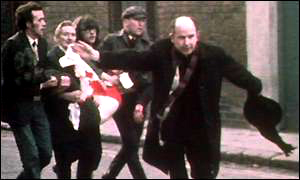
On 15 June, Lord Saville finally published his inquiry into the events of Bloody Sunday, 30 January 1972, when British paratroopers shot 26 Irish nationalists at a mass demonstration in Derryagainst internment, murdering 14 of them. Prime Minister Cameron in the House of Commons apologised on behalf of the British government, stating that the actions of the soldiers were ‘unjustified and unjustifiable’. The Saville Inquiry vindicates the innocence of those who were shot, finding them all to have been unarmed, but also finds no blame attaching to the British government and higher echelons of the British Army for the massacre.
In the immediate aftermath of Bloody Sunday, the British government set up the whitewash Widgery Tribunal, which promptly gave the soldiers the all clear. The victims of state violence were then targets of a vicious propaganda campaign designed to paint them as ‘gunmen and nail bombers’, which Widgery himself endorsed. The British government only agreed to set up a new inquiry when political expediency required a concession to the nationalists as part of the Good Friday peace process
In reality the role of the British government has never been investigated. The parameters were tightly restricted, and nowhere do the words ‘unlawful killing’ or ‘murder’ appear in this report. Saville denies any suggestion of high level political involvement in the massacre, stating: ‘The immediate responsibility for the deaths and injuries on Bloody Sunday lies with those members of Support Company whose unjustifiable firing was the cause of those deaths and injuries’.
The soldiers who testified were granted immunity for their evidence and can only face prosecution if they are considered to have perjured themselves. Whether such proceedings are brought will be determined not by whether there is sufficient evidence but by political considerations, rendering prosecution unlikely.
Of the hundreds of Irish people the British army has murdered in Ireland over the course of the conflict, only two have ever resulted in prosecutions. Convicted of murder, the soldiers involved served four and six and half years before being released to rejoin and take up promotions within their regiments. More than that, British imperialism established legal precedents in preventing prosecutions being brought against security personal on public interest grounds following the Stalker Report’s exposure of a shoot-to-kill policy in the 1980s.
The Saville Inquiry took 12 years and cost £195 million. As the families have pointed out, the lives of their those massacred that day are priceless. But the British government will consider the money well spent if it secures legitimacy for its rule in Ireland among the majority of nationalists.
The responsibility for Bloody Sunday lies squarely with British imperialism. It was the British government that had tried to violently suppress the nationalist uprising in the north of Ireland from 1969 onwards. It was the British government that introduced internment without trial in August 1971 and tortured the internees. It was the British government that sanctioned a ban on all demonstrations for a year after the introduction of internment. It was the British government that authorised the deployment of the Parachute Regiment, fresh from brutally suppressing the opposition movement in Aden, with the clear purpose of terrorising the Irish people off the streets and crushing the nationalist movement.
There is no validity to issuing an apology for this massacre when it is quite clear that the British government and its Army will massacre, torture and violently suppress its opponents again whenever it feels it is necessary: witness the Iraq war, the war in Afghanistan, and the treatment of opponents to those wars. After 38 years it is time to build a movement that will stop British imperialism in its tracks.
Paul Mallon
Fight Racism! Fight Imperialism! will consider in more depth the importance of the events of Bloody Sunday in the context of the revolutionary struggle against British imperialism in Ireland and the purpose of the Saville report in the next print edition.




